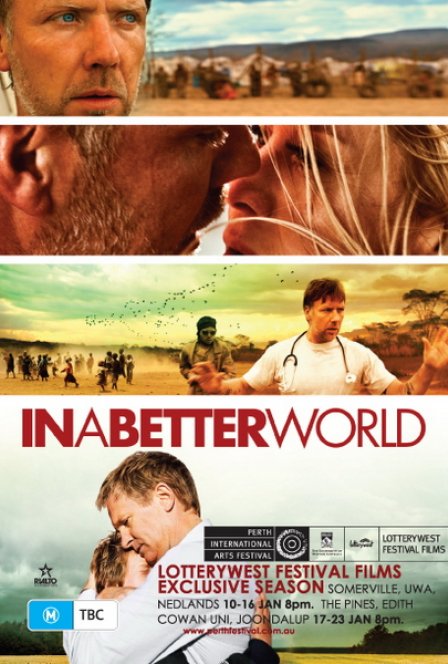In tone and style, Danish filmmaker Susanne Bier’s Oscar- and Golden Globe-winning film In A Better World could be a Hollywood film, but its provenance (and subtitles) consign it to the foreign film category. There it kept strange company with the likes of Greek filmmaker Giorgos Lanthimos’ Dogtooth, a bizarre, twisted, and formally rigorous film about an isolated family. Bier’s films are far more freewheeling and epic, marked by both nuanced characterization and a flair for melodrama. Her dramatic choices are also colored by a global sensibility, and she takes seriously the moral and psychological implications of being global citizens. As a recent New York Times article noted, Hollywood lags far behind other countries in terms of realistically portraying — or even showing interest in — the complicated relationship between Western and Islamic worlds. Sure, it lacks the realism and darkness of a film like Jacques Audiard’s A Prophet. But rather than being “too commercial” for a foreign arthouse flick, Bier’s film has the potential to bring subtitles, and substance, to the multiplex.
Bier’s recent films include Brothers (remade in 2009 with Jake Gyllenhaal, Natalie Portman, and Tobey Maguire) and After The Wedding, also an Oscar nominee. These films share certain qualities with In A Better World: they are family dramas, center around relationships, and are equally defined by Bier’s foreboding sense of fate. From the onset, we can see the cracks showing, and through a combination of conflict and calamity, Bier brings already strained relationships to the breaking point. Her characters (usually fathers) have professional and moral obligations to their work as military officers, educators, or aid workers in the Third World. In an almost schizophrenic way, it is precisely this ‘good’ work that causes them and their families so much pain. This setup is a manipulative but interesting one, looking critically at not only the notion that the West owes developing nations and governments a helping hand, but also the viewpoint that aid is an unequivocal good.
In A Better World has a more apt Danish title, Hævnen, which translates to “Revenge.” The setup involves two families, one broken by infidelity, the other by death. Christian (William Jøhnk Nielsen) has lost his mother to cancer, and his grieving father Claus (Ulrich Thomsen) transfers them from London to a small Danish town. Claus distracts himself with work, leaving the bereft and angry Christian to his own devices. Anton (Mikael Persbrandt) is a doctor at a refugee camp in a country similar to Sudan, and his repeated absences, as well as an affair, have caused a separation from his wife and their two sons. Elias (Markus Rygaard), the elder son, is being bullied at school, and when Christian stands up to the bullies, the two boys become friends. Both boys lack male role models, or much supervision, and Christian’s growing anger leads them into increasingly dangerous pranks and confrontations. The suspense builds as we wonder whether the parents will finally notice and intervene before irreversible damage is done.
While Brothers employed tinny video and slightly rough handheld camerawork, the production value of this film is a definitive step up. Bier does a nice job using landscape, color, and music to distinguish between the vibrant, cruel chaos of the refugee camp and the hushed, polished confines of wealthy Denmark. Bier is frank about showing how the African refugees experience horrific struggle and pain, but also remains sympathetic to the neglected teenage boys. She is deft at teasing apart the ironies and contradictions existing in both worlds, as well as the costs and far-reaching consequences of sacrificing one’s own family for a ‘cause.’ Credit also goes to Bier’s strong cast, in particular Nielsen and Rygaard, who give extremely compelling performances as Christian and Elias. It may be correct to characterize Bier’s work as melodramatic, but it’s also delightfully thought-provoking.

